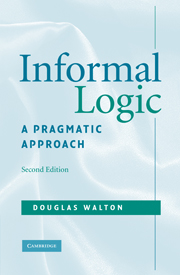Book contents
- Frontmatter
- Contents
- Preface
- Acknowledgments
- Informal Logic
- 1 Argument as reasoned dialogue
- 2 Questions and answers in dialogue
- 3 Criticisms of irrelevance
- 4 Appeals to emotion
- 5 Valid arguments
- 6 Personal attack in argumentation
- 7 Appeals to authority
- 8 Inductive errors, bias, and fallacies
- 9 Natural language argumentation
- Bibliography
- Index
5 - Valid arguments
Published online by Cambridge University Press: 05 June 2012
- Frontmatter
- Contents
- Preface
- Acknowledgments
- Informal Logic
- 1 Argument as reasoned dialogue
- 2 Questions and answers in dialogue
- 3 Criticisms of irrelevance
- 4 Appeals to emotion
- 5 Valid arguments
- 6 Personal attack in argumentation
- 7 Appeals to authority
- 8 Inductive errors, bias, and fallacies
- 9 Natural language argumentation
- Bibliography
- Index
Summary
The basic building blocks of arguments are propositions. Propositions, in contrast to questions, commands, challenges, and other moves made in arguments, are units of language that are true or false. Locating the propositions asserted in an argument can be the first positive step in identifying and evaluating the argument. In practice, real arguments are most often macrostructures made of many smaller arguments or sub-arguments. Often the best way to get a handle on a large and complex network of argumentation is to identify and clearly state one or more of these subarguments.
For this purpose, it is necessary to understand the concept of a deductively valid argument. With this ideal in mind, it will be much easier to organize an argument, and to fairly interpret it prior to considering evaluation. And of course, being able to identify deductively valid arguments is also a useful skill when it comes to evaluating arguments as reasonable or unreasonable.
In this chapter, we will see how once an argument is identified, the form of the argument can be revealed. Certain forms of argument are deductively valid, while others are invalid. Certain characteristic forms of deductive argument are very common in reasoning. To learn to identify these forms of argument is a valuable tool in the business of evaluating arguments reasonably. Another important concept related to validity is that of inconsistency. To allege that someone has adopted a stance in argument that is logically inconsistent can be a serious and damaging type of criticism.
- Type
- Chapter
- Information
- Informal LogicA Pragmatic Approach, pp. 136 - 169Publisher: Cambridge University PressPrint publication year: 2008



